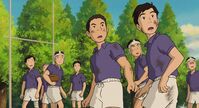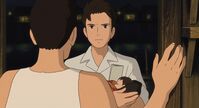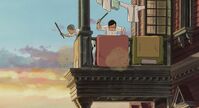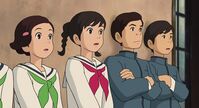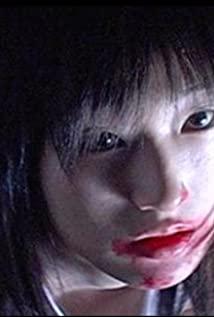"Kokurikozakasaka" is adapted from the theme of girls' comics, and popular stars are invited to dub. The story exudes a strong sense of nostalgia. These are the distinctive features of Stajjiri's production. The film has worked hard to restore the scenes of the 1960s, and the strong nostalgic atmosphere is interspersed with passionate student life, and at the end, it reveals a touch of sad emotions. This emotion is most in harmony with the look back in 2012. , The audience is prone to emotional resonance.
"Kokurikozaka" was released after the Great Earthquake in Japan. At this time, Japanese people need a firm belief in facing difficulties. The movie can also make this call-the role of the girl who raises the flag is set, like the signal flag itself is used to convey The message is placed in the film, and it naturally has a different meaning.
On the surface, Ahai hopes that his dead father will return, for good hope. This kind of dialogue between the present and the past is actually the intention of "コクリコ坂から"? You know, it is also standing today in dialogue with Japan in the 1960s. With the help of flags, the film also brings the thoughts of the characters back to the past. As well as the old photos and the mystery of Shun Kazama’s life experience, like who is his father and where is his father? Once these problems arise, the appeal of "Kokuriko Saka" will become more clear. There is no doubt that the Japanese have firmly believed from the beginning to the end: they must become a modern country, and a modern Japan can bring people's well-being. Even if there will be wars and deaths, they will all be slowed down. Slowly heal, let it go with peace of mind.
So at the end of the film, the film strives to convey spiritual inspiration, facing the wind and bathing in the evening light. The next day, the girl continued to raise the signal flag. Just like the theme song "Farewell Summer" sings: If I whisper in the sunset, can I meet the gentle you; look back in the sunset, if you are looking for me. Obviously, like the "Sanchome Sunset", the sunset is like Japan's past, and tomorrow will be a new day.
However, in addition to the theme song, "コクリコ坂から" has another song called the "soul of the whole film", namely Sakamoto Kyuu's classic song "Going Forward". The embarrassing thing is that when this song appears, the characters in the film are Not walking forward with head up, but going downhill. Maybe the creator didn't think clearly about whether it should be uphill or downhill. In addition to these, there is another clue in the film for students to protect the Latin Building. The sense of independence and freedom it conveys is still passionate and joyous
.



